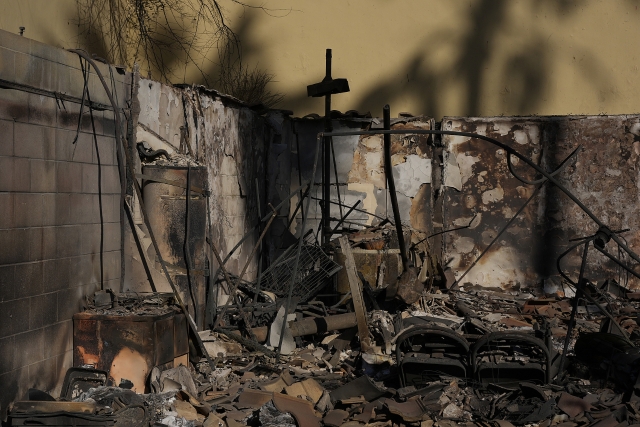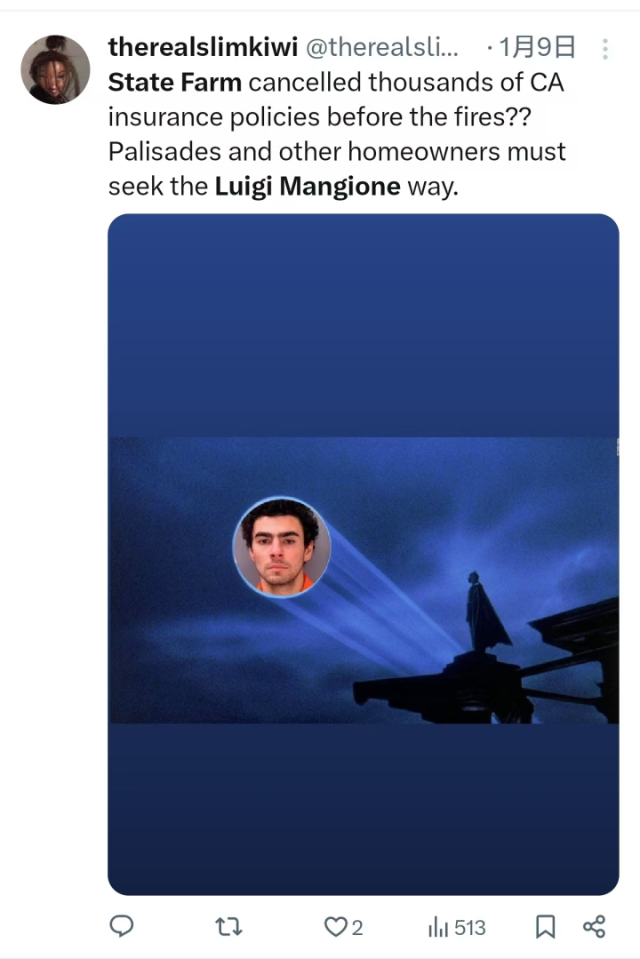
The remains of a house destroyed by the Eaton Fire are seen on January 16, 2025, in Altadena, California. (Photo: CFP)
As wildfires ravaged California, claiming at least 29 lives and leaving thousands of buildings reduced to rubble, a new wave of outrage erupted across social media. Public fury extended beyond the devastation itself—it zeroed in on several of California's major insurance companies, which had preemptively canceled homeowners' policies in communities now left in ruins. Amid this unfolding crisis, one name repeatedly surfaced online: Luigi Mangione.
Mangione, who previously called out the U.S. insurance industry for its alleged tactics of "deny, defend, and depose," has become a symbol of growing anger toward the country's public services. The outcry over insurance cancellations in California's fire-ravaged communities underscores a broader struggle—one where corporate risk management appears to outpace government disaster preparedness, leaving homeowners without a safety net when they need it most.
Policy cancellations leave homeowners stranded
Just weeks before the fires erupted, several of California's top insurance companies abruptly raised premiums or canceled thousands of policies. Seven of the state's 12 largest insurers suspended or restricted nearly three million policies, including hundreds of thousands in Los Angeles. As a result, countless homeowners found themselves unprotected when disaster struck.
State Farm, the largest home insurer in the U.S., was among the most aggressive. By the summer of 2024, it had canceled 72,000 policies in California—30,000 of them covering homes. In Pacific Palisades, a community devastated by the Palisades Fire, 1,626 policies were terminated. The abrupt cancellations left many homeowners with no recourse, as they faced both displacement and financial ruin.
Industry leaders defend these decisions, citing heightened risk assessments. The Los Angeles region, insurers argue, has become increasingly vulnerable due to worsening wildfires. Additionally, California law restricts insurers from raising rates without state approval, a policy that has led some companies to simply exit the market instead of navigating the regulatory process. While a new wildfire catastrophe modeling regulation was announced in November 2024, it has yet to take effect, leaving insurers with limited tools to adjust pricing based on climate risk projections.
"The insurers saw this coming," said Wang Chong, a distinguished professor at Zhejiang International Studies University. "They have actuarial teams, lobbying groups, and legal experts who know how to navigate, and sometimes even influence, the law to protect their interests. They won't break the law, but they will always stay ahead of it."
While insurance companies acted swiftly to mitigate their financial risk, the response from the California government was markedly slower. State officials failed to implement meaningful precautions ahead of fire season, and budget cuts further weakened emergency response efforts. The state reduced its firefighting budget by 17.6 million USD, while alarm systems failed and rescue teams struggled to mobilize in time.
The juxtaposition—private companies proactively shielding themselves from financial exposure while the government fell behind in disaster preparedness—has only deepened public frustration.
Luigi Mangione resurfaces as a symbol of defiance
As the fires raged and policyholders reeled from their losses, social media users turned once again to Luigi Mangione as a folk hero of sorts—an embodiment of collective frustration with the insurance industry. His name and memes flooded platforms like X, where users expressed anger at the seemingly calculated nature of the policy cancellations.
"The fact that State Farm removed fire policies for certain zip codes in California weeks or months before the fire hit is unbelievable," wrote user @stoppfeenin on X. "People are left without means to rebuild or any access to financial support. I understand Luigi Mangione now." Another user posted a photo of Mangione alongside the caption, "Who is the CEO of State Farm?"—a thinly veiled call for accountability.

A post on X, sharing an image of Batman alongside Luigi Mangione's face.
The California wildfires have reignited not just literal flames but also longstanding grievances over the state of public services in the U.S.
As Luigi Mangione's name continues to trend across social media, it is clear that his legacy is more than a passing meme. He has become a symbol of the growing divide between private institutions that prioritize profit and public services that fail to protect their citizens. As frustration mounts, so too does the search for accountability—whether in courtrooms, on social media, or in the next election cycle.
Co-presented by GDToday and the School of Journalism and Communication, Jinan University
Reporter | Liu Xiaodi, Zhan Manqi (intern)
Editor | Yuan Zixiang, James, Shen He

















